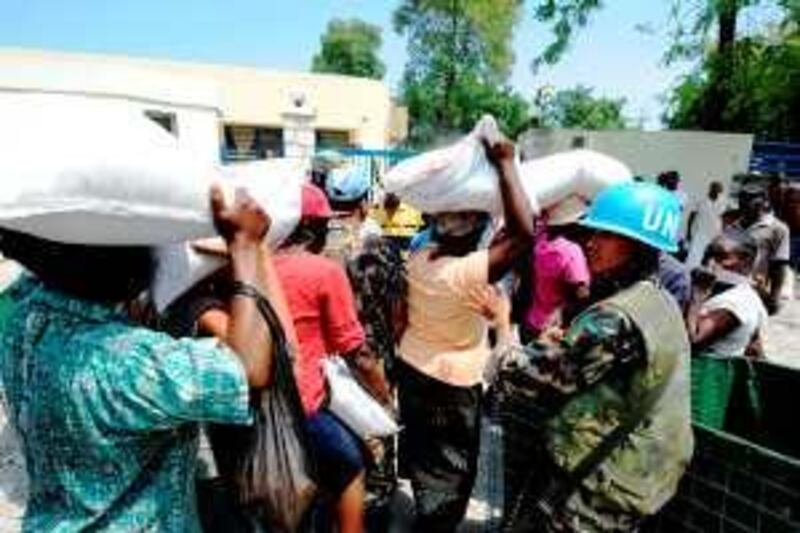Poor exposure and transparency are being blamed for the results of a survey that found a third of respondents do not trust charities in the region. While some charity officials rejected the findings of the recent YouGov Siraj online survey as invalid, others acknowledged a failure of communication and a strong need for accountability to the public on the part of charities.
In the survey, 35 per cent of respondents indicated that they do not trust local charitable organisations in the Middle East, and 32 per cent said they refused to donate to the charities because they did not have a wide enough reach. "It may be that those who are not donating could be sceptical about how well their money will be spent or not sure of the process's integrity," said Iman Annab, the chief executive of YouGov Siraj.
"The findings indicate that there seems to be a need for greater transparency surrounding the donation process and charitable foundations across the Middle East." The survey polled more than 2,600 Middle Eastern residents, more than a quarter of whom were from the UAE. The rest were from Saudi Arabia, Jordan and Egypt. The Red Crescent Society, which is responsible for regulating all charities in the UAE, dismissed the results.
"We reject completely the findings of this report," said Abdulrahman al Tenaiji, a spokesman for the Red Crescent in the UAE. "We have credibility, and international organisations like the United Nations recognise the UAE's contributions." However, he acknowledged that the inability of charities to showcase results on the ground contributed to a lack of trust among donors and a perception that philanthropies are not transparent.
Mr al Tenaiji blamed the media, which, he said, were less interested in humanitarian stories. "The media is not responsive to humanitarian work and doesn't show the whole picture, so our credibility and transparency are undermined with the donor." He added that charitable work in the UAE was "not tainted or narcissistic" and gave equal opportunities to nationals and expatriates. Ms Annab indicated that, despite the presence of regulations, there was no communication of these safeguards.
"Although governments may already have a system in place to regulate charities and ensure that funds are not misappropriated, a large portion of the public seems not to be aware of any," she said. "To increase trust, and therefore encourage donations, it is important to find a mechanism by which the public is made aware of this." George Vitty, the chief executive of Nahtam, a UAE group that promotes social responsibility projects, said that a lack of communication was the main hurdle preventing transparency within charities. It was hard for donors, given the cosmopolitan culture of the UAE, to get the Red Crescent's message, since it communicated mostly in Arabic.
The Red Crescent's position as the only group overseeing the collection of donations, as well as sending donations overseas, could inhibit a quick response to a sudden international call for aid, said Mr Vitty, and there could be advantages to having more authorised groups. But accountability to the Red Crescent also had its strong suits, according to Nasser al Nuaimi, the former manager of the chairman's office at the organisation.
Official agreements by the International Committee of the Red Cross allow the Red Crescent to deliver aid in locations that other groups might struggle with, and it helped to prevent groups from collecting money from donors that would be laundered and then used to finance illegal arms trading during the First Gulf War and the Second Gulf War, Mr al Nuaimi said. There were legitimate concerns surrounding charities when it came to how the donations were spent, said Lola Lopez, a social worker and the founder of Volunteer in Dubai, a group that helps local charity groups and events.
Some event companies spent exorbitantly on projects the donors would surely not approve of and could be obtained without cost from willing community members, she said. She cited a local organisation that wanted to pay Dh20,000 (US$5,450) to book models for a photo shoot for their website, and another that refused to accept a donated plasma TV because it was second-hand, choosing instead to splurge on a new model.
"Charities here have been mollycoddled for far too long," said Ms Lopez. "Being in an affluent country, they're used to having money coming in so they just spend it easily." She said some companies also abused the requirements for setting up charity events, often sending as little as five per cent of profit from the events to bereaved groups. While the Government could ensure that the money was delivered, there was no requirement for how much the company was obliged to send, she said.
All these factors had led to "donor fatigue" said Ms Lopez, who was not surprised at the low levels of trust for charities, saying there should be "way more transparency". "If they are behaving honourably there is no reason why they can't make accounts visible to the public," she said. "It shouldn't be private. After all, it's the public's money." @Email:kshaheen@thenational.ae hdajani@thenational.ae







